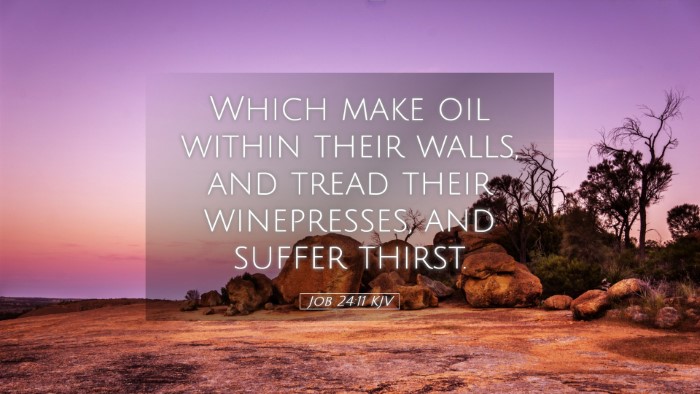Old Testament
Genesis Exodus Leviticus Numbers Deuteronomy Joshua Judges Ruth 1 Samuel 2 Samuel 1 Kings 2 Kings 1 Chronicles 2 Chronicles Ezra Nehemiah Esther Job Psalms Proverbs Ecclesiastes Song of Solomon Isaiah Jeremiah Lamentations Ezekiel Daniel Hosea Joel Amos Obadiah Jonah Micah Nahum Habakkuk Zephaniah Haggai Zechariah MalachiJob 24:11
Job 24:11 KJV
Which make oil within their walls, and tread their winepresses, and suffer thirst.
Job 24:11 Bible Commentary
Bible Commentary on Job 24:11
Verse Context: Job 24:11 states, “They crush olives within their walls; they tread the winepresses, but suffer thirst.” This verse paints a vivid picture of the harsh realities of life and the injustice that often occurs in the world.
Thematic Elements in Job 24:11
This verse speaks to the themes of labor, oppression, and the stark contrast between effort and reward. Job, amidst his suffering, reflects on the experiences of many who toil yet reap little benefit from their labor.
Commentary Insights
Matthew Henry
Matthew Henry provides an insightful analysis of the injustices faced by the poor and downtrodden in society, emphasizing how they work tirelessly without seeing the fruits of their labor. He notes that despite the effort one puts into cultivating the land or processing goods, there is a pervasive sense of unfulfilled promises in the outcomes.
- Crushing Olives: Henry describes the act of crushing olives as a metaphor for the burdensome labor faced by the oppressed, suggesting that even in their toil, they remain unfulfilled.
- Treading the Winepresses: The imagery of treading the winepresses is significant; it denotes that those who work are often stripped of their rewards, which indicates a misalignment between effort and the enjoyment of bounty.
Albert Barnes
Albert Barnes further elaborates on the meaning of this verse by highlighting the laborious tasks that individuals undertake, yet they often do so in vain. His commentary reveals the despair faced by these laborers who endure hardship without the promise of sustenance.
- Labor vs. Reward: Barnes emphasizes the irony that those who engage in fruitful labor should, in theory, expect to reap from their efforts. However, the reality is bitter as they continue to suffer from a lack of basic necessities.
- Human Condition: He points out that this condition reflects broader human experiences where the inequity of life often prevails, revealing the need for divine justice and intervention.
Adam Clarke
Adam Clarke brings a detailed exegesis focusing on the cultural practices of the time, explaining that olives and wine were key agricultural products in ancient Israel. He dives into the social constructs surrounding these commodities, indicating that their production tied the laborer’s worth to their output.
- Cultural Significance: Clarke mentions that the act of treading the winepress was significant not only for its agricultural implications but also symbolically for expressing lament over the hunger and thirst that accompany hard work.
- Spiritual Implications: He notes that the thirst in the verse symbolizes the deeper spiritual thirst for justice and righteousness, linking back to the overall message of Job as one of seeking understanding in the face of suffering.
Theological Reflections
The exploration of Job 24:11 opens a dialogue about the nature of divine justice. Each commentator reflects on how this verse serves as a testament to the struggle of the faithful who endure immense suffering while grappling with their understanding of God’s justice.
- A Call for Justice: The need for divine justice is echoed throughout the book of Job; this verse is emblematic of a cry for equity in the face of overwhelming adversities.
- Communal Living and Labor: The verse encourages a reflection on the communal aspect of labor and the collective plight of the marginalized, urging readers to consider their role in supporting social justice.
Conclusion
In summary, Job 24:11 serves as a poignant reminder of the harsh realities of life, particularly for those engaged in toil without reward. Through the insights of Matthew Henry, Albert Barnes, and Adam Clarke, we gain a comprehensive understanding of the complexities surrounding issues of labor, injustice, and the human condition in a world often devoid of immediate recompense. This passage continues to resonate with contemporary readers, inviting pastors, students, theologians, and scholars to reflect on their own experiences, responsibilities, and the quest for justice in their communities.


